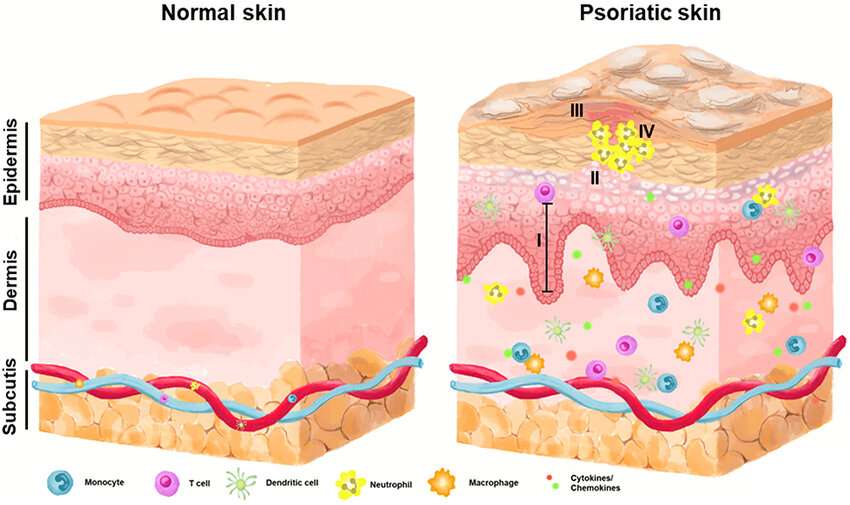Psoriasis is the most common autoimmune disease of the skin. Causes are complex and poorly understood. Treatment means going back to basics, to hunt for clues in the health history.
Autoimmunity and the skin

There are many types of skin problem, commonly lumped together as ‘eczema’ (technically dermatitis) and including also common conditions like acne and shingles. Some of these may have an immunological component but full autoimmunity is involved in a few particularly challenging skin problems, for example psoriasis, vitiligo and dermatomyositis. There are no easy solutions to any of these. We can look at the most common as an example.
Psoriasis is a chronic inflammation of the skin, with red, inflamed patches that can develop into plaques and scales on the elbows, knees and scalp or anywhere else. Psoriasis usually develops in adulthood, and the causes could be due to prior infection, genetic factors, environmental factors and lifestyle factors.

The skin consists of three strata – the dermis, epidermis and hypodermis. Beneath the epidermis is the dermis; between them is the basal membrane, This single layer of cells (‘keratinocytes’) reproduces itself to form new layers above, each being pushed towards the surface as a new layer is formed underneath. As this happens the layers progressively die off to leave their leratin skeletons, thus forming and replenishing the outer epidermis. It normally takes each cell layer about a month from budding off the basal membrane to being rubbed off as keratin.
In psoriasis, the basement membrane is attacked by a noxious interplay of immune cells and inflammatory cytokines: it speeds up its production of new layers so they reach the surface in a few days, as red scaly plaques, well before they have a chance to die off and become keratinised. The compromised basement membrane also allows inflammatory cells to move into the epidermis as well.
Patterns of psoriasis vary from multiple tiny lesions (guttate) through to major plaques.
A link has been found between psoriasis and disturbed skin microbiome, specifically more Staphylococcus aureus, less Staphylococcus epidermidis and Propionibacterium acnes, and a wider diversity of organisms in general. These disrupters may provoke immune responses. Staphylococcus infection is also diagnostic of eczema so appears to be a common factor in other skin inflammations: what distinguishes psoriasis from eczema as outcomes of this infection presumably relates to other immunological factors.
Infections like strep throat may also have some links to psoriasis.
Apart from confirming the complexity of the interplay between genetic and environmental factors, there is no current understanding of what causes psoriasis. The skin is a genetic mosaic so this is the best explanation as to why some patches erupt and others do not. Among environmental factors identified there are low vitamin D, smoking and pollution. People with psoriasis are more likely than others to have higher blood lipid (fat) levels, blood pressure, coronary artery disease, type 2 diabetes, and increased body mass index. However all these may be an effect of the condition as much as a cause.
Psoriasis is also identified as generating a form of autoimmune joint disease, psoriatic arthritis. The psoriasis flare-ups and arthritis pain can happen at the same time and in the same place, but not always. It can also inflame the joints in and near the spine- spondylitis – causing back and neck pain and disability.
This is unfortunately one area of autoimmunity with very few answers. It forces those looking for natural approaches to start from basics: what events, infections or illnesses could have been important in the story?
Practitioners will roll up their sleeves and look at any clue or potential provocation in the life story to see whether they could lever some benefits on the psoriasis itself. Stress is often such a provocation though harder to manage than it sounds and not the underlying problem. Often trouble can be found lurking where it does in other autoimmunity problems, in the gut microbiome and gut wall.
For a deep dive into psoriasis check out these links:

Recent Comments